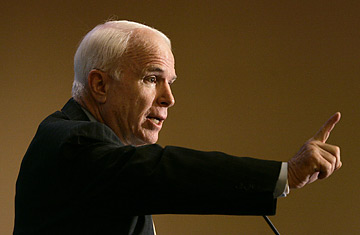
Presidential hopeful Senator John McCain speaks at a campaign event in Santa Clara, California in July.
The only thing disappearing from John McCain's campaign faster than funds are his senior campaign staff. Last month, in the course of one week, McCain's chief strategist, campaign manager, research director, political director and communications director (plus his two deputies) all resigned. With less cash on hand than libertarian gadfly Ron Paul, the one-time nominee-in-waiting is now stuck in third or fourth place in most polls among the Republican pack.
So what's a one-time front-runner to do? And more importantly, what's he supposed to say?
In his first campaign appearance after the initial wave of resignations, McCain—once known for his bipartisanship— blasted his Democratic opponents: "Democratic candidates for President will argue for the course of cutting our losses and withdrawing from the threat in the vain hope it will not follow us here. I cannot join them in such wishful and very dangerous thinking." Last month, McCain tried to enter the Obama-Clinton feud by attacking the Illinois Senator for his "naivete." And in last Sunday's presidential debate, McCain made sure that the audience knew he was a warrior: "I am fully prepared—fully prepared, more than anyone else running on either side—to fight the transcendent challenge of this nation, which will be for all of the 21st century. And that is the struggle against radical Islamic extremism."
In freeing himself to throw haymakers, McCain is following a well-worn path for down-but-not-out candidates. To show there's life in 'em yet, this group almost uniformly tries to whip up partisan crowds with pugilistic phrasemaking, amp up the vitriol against their opponents, and turn the language of necessity into a virtue. (Message: I can fight—and I'll fight for you too!)
Think back to the fall of 1999, when Bill Bradley rocked Al Gore's world by equaling Gore's fundraising and pulling even, if not ahead of him, in early New Hampshire polls. As part of a retooling that saw the campaign move its headquarters to Nashville and change in its entire high command, Gore went to the Iowa Democratic Party's Jefferson-Jackson Day dinner, where he pledged to "stay and fight" for Democratic policies and values. "I make you this promise tonight: in all the months and miles to come—I will stay. I will fight. And I will never let you down," Gore concluded after leading a stacked audience in a call and response of "stay and fight" (itself a veiled attack on Senator Bradley's choice to retire from the Senate).
At the exact same venue four years later, a floundering John Kerry—weeks away from mortgaging his house to pay for his presidential bid—restarted his campaign with a searing attack on every aspect of George W. Bush's leadership, culminating in this rhetorical right hook: "I know something about aircraft carriers for real. And if George Bush wants to make this election about national security, I have three words for him he'll understand: Bring. It. On."
Part of being a convincing fighter is also demonstrating that your toughness isn't a recent development. And that's why so many fighting words are tied to personal biography. In 1996, Bob Dole—15 points down against Bill Clinton, restarted his campaign by resigning from the Senate in a way that reminded voters that he has gritted his way through adversity before: "...I will be the same man I was when I walked into this room, the same man I was yesterday . . . and a long time ago, when I rose from my hospital bed and was permitted by the grace of God to walk again in the world. I trust in the hard way, for little has come to me except the hard way."
After Dole'speech announcing he was stepping down from the Senate to restart his Presidential bid, one Senator stood up and declared, "Today the President [Clinton] learned he is in the biggest fight of his political life." Yep, the speaker was John McCain.
Kenneth Baer is the founder of Baer Communications, LLC. Jeff Nussbaum is a principal of the communications firm West Wing Writers. Both were speechwriters for Vice President Al Gore.
